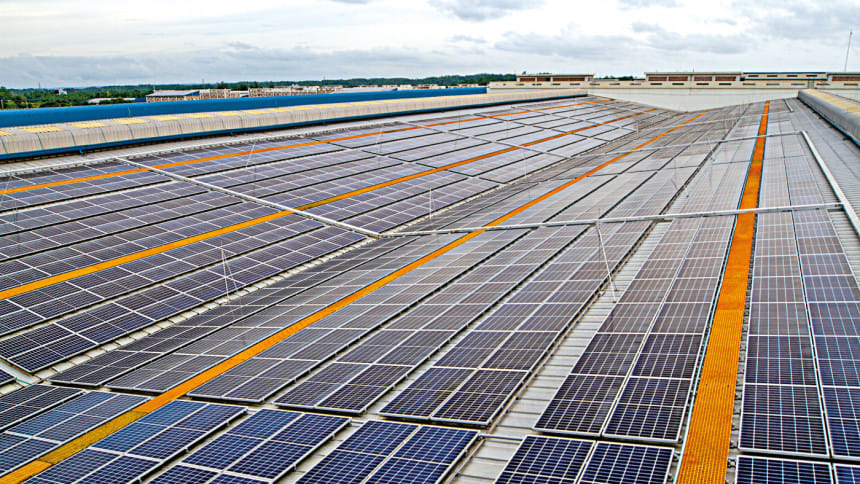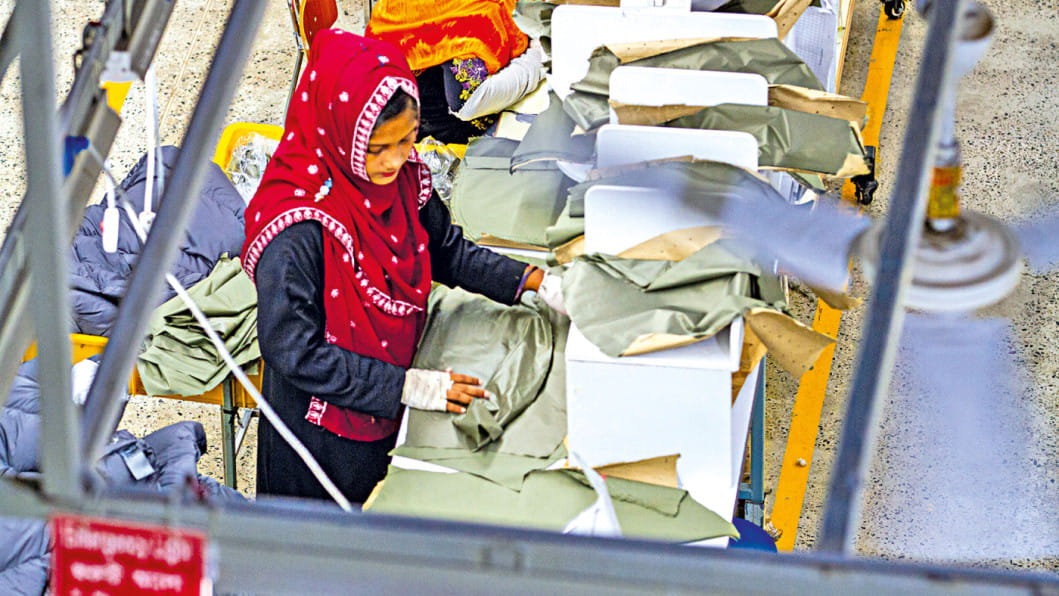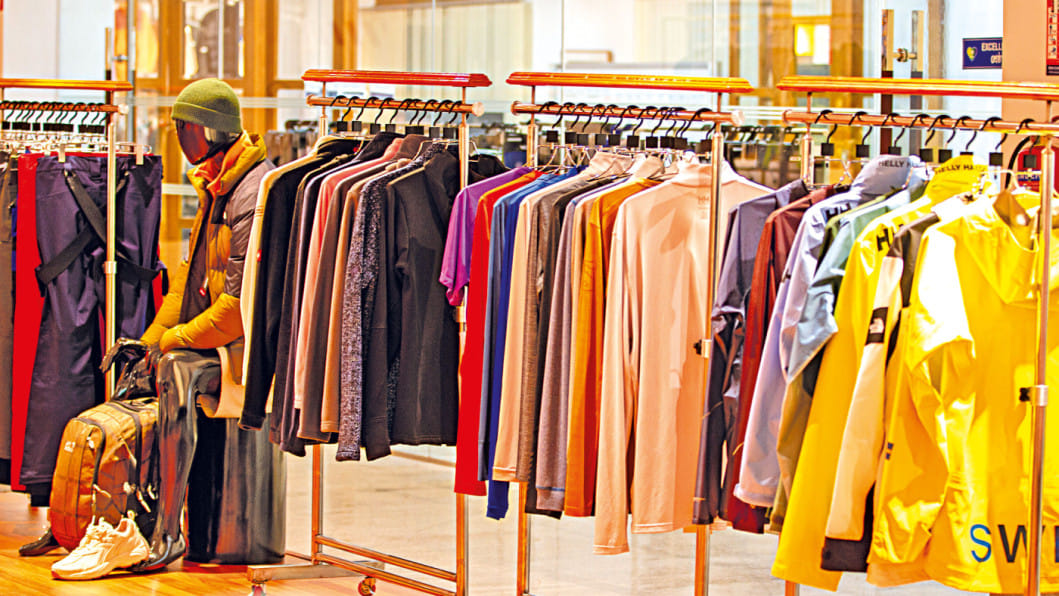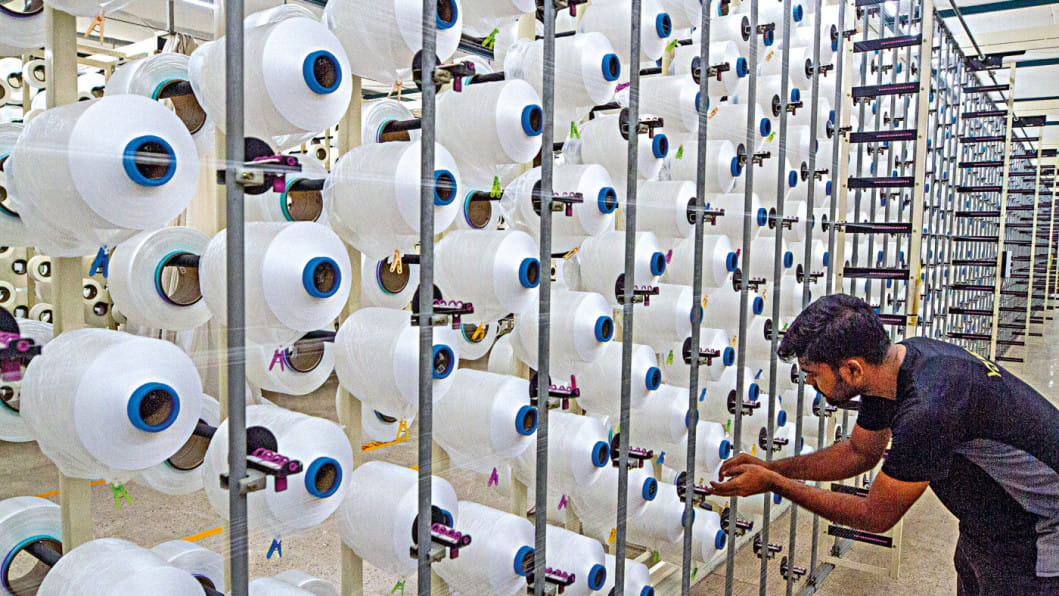Korean EPZ: A modern facility draped in greenery
Our journey to the Korean Export Processing Zone (KEPZ), an eco-friendly industrial area in Chattogram, began on a sunny morning.
Upon reaching our destination located in Anowara, about 40 kilometers southeast of Chattogram, we passed through an automated entrance and observed several well-designed, multi-storied buildings.
To the right, a warehouse and a highly sophisticated factory operated by a world-renowned company came into view. On the left, a vast facility to produce much-needed manmade fibre (polyester yarn) caught our attention although it was still under construction.
We then drove past a long stretch of factory units housing padding, printing, and garment-making facilities.

Initially, everything was quiet. Security personnel, on high alert, were the only ones visible outside the large prefabricated structures.
As we continued, we found ourselves surrounded by lush greenery and complete tranquillity. The landscape featured shrubs, trees such as ear leaf acacias, and small lakes nestled between rolling hills.
If fortunate like us, one might catch a glimpse of a wild elephant peacefully grazing on the shoreline opposite one of the lakes, where a dense green forest adds to the sense of seclusion and wilderness.
The KEPZ covers 2,492 acres of land, of which 52 percent is kept green by plantations, water bodies and open areas.
This unique zone is the country's only private export processing area where humans, machines, flora and fauna peacefully coexist.
Within the industrial enclave, there are 33 lakes and waterbodies, which attract around 137 species of bird and more than 87 mammals.
A subsidiary of the South Korean Youngone Corporation, the KEPZ currently hosts 48 industrial units, largely under the ownership of Youngone.
Youngone is recognised as one of the early leaders in setting up garment factories in Bangladesh for overseas exports.
Its EPZ-based factories specialise in producing premium jackets, trousers made from synthetic fibre, sports shoes, leather handbags, backpacks, and travel bags for international retail markets.
Presently, the KEPZ factories collectively export goods worth approximately $400 million each year.
"Our goal is to increase annual exports to $1.2 billion from the KEPZ. We are optimistic about reaching this target once the facility is operating at full capacity," Md Shahjahan, managing director of the Korean EPZ (KEPZ) Corporation (BD) Ltd, shared during our meeting at the dormitory, which provides accommodation for overseas employees and clients.

Since the commencement of the project, the KEPZ has created direct job opportunities for 31,000 individuals, most of whom are female, within the industrial facilities. It has also created over 25,000 indirect jobs outside the zone.
The private industrial enclave commenced operations in 2011 under the Bangladesh Private EPZ Act.
"This area was once an undulating and sandy hillock, with most of it being 'khas' land that was left barren. We developed this area while preserving its natural surroundings," Shahjahan stated.
Officials reported that they had planted 27 lakh trees to enhance forestry, encompassing over 400 plant species.
A six-kilometre main road has been constructed by the authorities to facilitate the transportation of raw materials and finished goods to and from factories, with a total road network of 40 kilometres within the KEPZ.
The KEPZ is the third major project undertaken by Youngone, following their decision to start manufacturing garments for export markets in 1980.

Youngone Chairman Kihak Sung, a Korean national, chose to invest in Chattogram, leading the way in garment production in Bangladesh through a partnership with a local company. Production began in a rented facility in the port city.
In 1987, Youngone set up a factory in the Chittagong Export Processing Zone. The Dhaka EPZ started operations in 1993 with Youngone's first investment.
Shaikh Shahinur Rahman, managing director of Youngone Group in Bangladesh, explained that all these factories specialised in producing apparel from manmade fibre.
The Korean investor diversified its production to include shoe manufacturing and emphasised expansion in 1997.
As per the authorities, of the 2,492 acres of land, 52 percent (1,296 acres) has been transformed into green areas to comply with the Environment Clearance certificate from the Department of Environment.
The remaining 48 percent (1,196 acres) has been designated for industrial use, including roads, utilities, and other logistical and infrastructural facilities.
Within this 48 percent, 30 percent is allocated to roads, utilities, and infrastructure, leaving 812 acres for industrial development.
A significant portion of this land has already been allocated to various investors for industrial setup, with 732 acres already developed.
Currently, factories and related facilities have been established on 600 acres while construction is ongoing on the remaining land.
Youngone is planning to construct 16 24-storey buildings in the private EPZ for software and IT development.
Shahjahan stated that they are exploring the idea of creating mixed-use towers in the IT block, which would offer both work and living facilities, in anticipation of generating 20,000 IT-related jobs.
This underlines further diversification.
In addition to garment, textile, and footwear facilities, Youngone has also set up 10 design and development centres (DDC) for global retailers and brands to create their products for international markets. These DDCs were designed by leading local architects, and are already operational.
"We do not allow polluting industries in the KEPZ. Any investor looking to set up textile and dyeing factories must establish effluent treatment plants (ETP)," he firmly stated.
KEPZ especially focuses on renewable energy and thereby supports the development of rooftop solar power technology as a way to produce renewable energy and decrease reliance on fossil fuels.
Youngone has established a 40-MW solar rooftop power plant in the KEPZ, which is the biggest in Bangladesh.
The foreign investor has also established dormitories to accommodate 5,400 female workers, alongside a medical centre and daycare facilities for working parents.
An automated kitchen prepares food to serve as lunch to the workers at a nominal price of Tk 2 only. The lunch hour begins at 11:30am and continues until 2:00pm to ensure that workers of all units can have their lunch in batches.
After moving from one production unit to another, we reached the canteen around 1:30 pm. The atmosphere was bustling, with workers chatting and engaging in various activities around the lunch tables.
Men and women, all holding blue tokens, stood in line patiently to receive their meals.

Upon entering the kitchen, Ferdous Al Kowser, the deputy general manager at Youngone Corporation in Dhaka, proudly stated: "We have a nutritionist who oversees the quality of food served to our workers."
Nearby is a medical facility where we found nearly a dozen of workers waiting to see doctors.
At the end of the workday, the fair price shop at KEPZ is bustling with activity.
Shahjahan stated that a majority of the workforce in the KEPZ are from nearby communities and started earning for the first time after joining the factories.
The employment opportunities have provided economic independence to female workers in the area, he added.
The creation of jobs in this area has led to an improvement in the socioeconomic condition. As a result, the local economy is thriving due to the increased spending by residents. Additionally, over 600 vehicles are utilised daily to transport workers to and from surrounding villages.
Asked about the incentives for investment in KEPZ, he informed that investors get all fiscal and non-fiscal benefits established by the government.
Shahjahan also added that chairman Sung has a vision to uplift the socioeconomic condition of Youngone's workforce.
He plans to build an international standard medical complex, which will include a general and specialised hospital, medical college, nursing college, and health technology institutes, to provide the best healthcare services to workers and their families.
He also aims to establish a technical institute and general education facilities to improve the skills of employees.
Sung also emphasises health and hygiene of the people of surrounding villages. To achieve this, a massive cleaning and awareness campaign is underway.
As we wrapped up our activities and started heading back in the evening, the main road, which had been quiet all day, suddenly became crowded with male and female workers, eagerly awaiting their rides home.
It was around 7:30pm when we arrived at the main entrance of the KEPZ.
In the distance, the sound of security personnel blowing whistles could be heard, helping workers get on buses and electric three-wheelers in an organised manner.


 For all latest news, follow The Daily Star's Google News channel.
For all latest news, follow The Daily Star's Google News channel. 


Comments